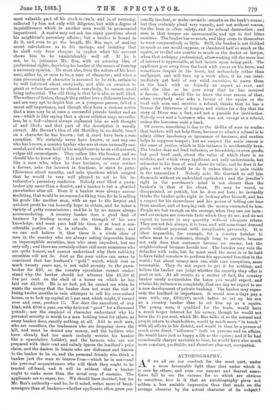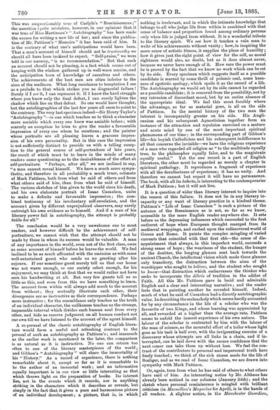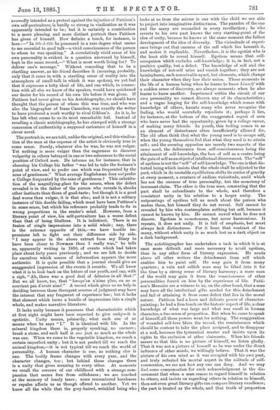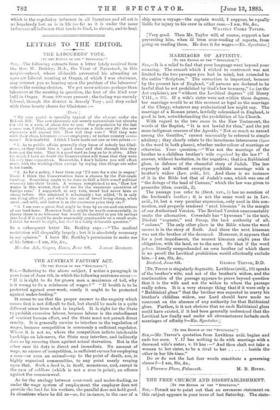AUTOBIOGRAPHY.
AS we all see our conduct, for the most part, under a more favourable light than that under which it is seen by others, and even our nearest and dearest sometimes fail to see the excuses for us which are obvious to ourselves, how is it that an autobiography gives not seldom a less amiable impression than that made on the average observer by the actual character of its subject P
This was unquestionably true of Carlyle's " Reminiscences ;" the assertion (quite mistaken, however, in our opinion) that it was true of Miss Martineau's " Autobiography " has been made the excuse for writing a new life of her; and since the publication of Mr. Pattison's " Memoirs " it has been said of him. It is the contrary of what one's anticipations would have been. That a man's account of himself should not be trustworthy we should all have been inclined to expect. " Self-praise," we were told in our nursery, " is no recommendation." But that such an account should not be pleasing, is a fact which seems out of keeping with the wisdom gathered up in well-worn maxim, and the anticipation born of knowledge of ourselves and others. The achievements of the best men are often inferior to the aims of the mediocre. What long resistance to temptation I see as a prelude to that which strikes you as disgraceful failure ! Surely if I see it, I can represent it. If I know the hard struggle where you know only the final defeat, I can surely lighten the shadow which lies on that defeat. So one would have thought; but the autobiographies of the last few years all seem to point to the contrary. The very last specimen indeed—Sir Henry Taylor's "Autobiography "—is one which teaches us to think a character more amiable which every one knew was amiable before ; with scarcely an exception he tries to give the reader a favourable impression of every one whom he mentions ; and the painter whose portraits are all pleasing leaves a gracious impression of his own personality. But in this case the impression is not sufficiently distinct to provide us with a telling exception to the general course of self-portraiture of late years, the result of which must be to leave in the minds of many readers some questioning as to the desirableness of the effort at self-portraiture. " Perhaps, after all," we are inclined to say, "a man cannot reveal himself. ' We have a much more sympathetic, and therefore in all probability a much truer, estimate of Mark Pattison, both from what he said of others and from what others said of him, than from what he said of himself. The various sketches of him given to the world since his death, and his own elaborate portrait of Isaac Casaubon, unite to make a definite and favourable impression ; the combined testimony of his involuntary self-revelation, and the account given by different unprejudiced observers, may surely outweigh his own evidence as to himself. And if a man of his literary power fail in autobiography, the attempt is probably futile for all."
The conclusion would be a very unwelcome one to most readers, and however difficult be the achievement of selfportraiture, we cannot wish that the attempt should not be made by those in whom its success would be valuable. A man of any importance in the world, even not of the first class, owes us some account of himself before he leaves the world. We feel inclined to be as much affronted with the omission as with some well-entertained guest who sends us no greeting after his sojourn. If our sometime guest merely tell us that our house was not warm enough, or our society select enough, for his enjoyment, we may think at first that we would rather not have seen his handwriting at all. But very few guests tell us so little as this, and even from this we have something to learn. The account from within will always add much to the account from without ; they mutually illustrate each other, their divergences are as instructive as their correspondence. Perhaps more instructive ; for the resemblance only teaches us the truth of an individual character, the unlikeness teaches us the strange, impassable interval which divides each human soul from every other, and bids ue reserve judgment on all human conduct not our own till we have listened to the account of the agent himself.
A re-perusal of the classic autobiography of English literature would form a useful and refreshing contrast to the perusal of such an autobiography as Pattison's ; and inasmuch as the earlier work is mentioned in the later, the comparison is as natural as it is instructive. No one can return too often to one of the literary masterpieces of the world ; and Gibbon's " Autobiography " will share the immortality of his "History" As a record of experience, there is nothing remarkable about it, except so far as it is remarkable to be the author of an immortal work ; and no information equally important is in our view so little interesting as that which throws light on the preparation of books. Its interest lies, not in the events which it records, nor in anything striking in the characters which it describes or reveals, but simply in the fact that it gives a pure and harmonious picture of an individual development ; a picture, that is, in which nothing is irrelevant, and in which the intimate knowledge that belongs to all who judge life from within is combined with that sense of balance and proportion found among ordinary persons only when life is judged from without. It is a wonderful tribute to the literary spirit. We see how it teaches a vain man to write of his achievements without vanity ; how, in inspiring the mere sense of artistic fitness, it supplies the place of humility ; how it gives just the right point of view for the self, as moral rightness would also, no doubt, but as it does almost never, because we never have enough of it. How rare the power must be is proved by the fact that we know no work which can be set by its side. Every specimen which suggests itself as a possible candidate is marred by some thrill of polemic zeal, some keenness of egotistic apology, which spoils it as the record of a life. The Autobiography we would set by its side cannot be regarded as a possible candidate ; it is removed from the possibility, not by any intrusion of discordant mood, but by an entire absence of the appropriate ideal. We feel this most forcibly where the advantage, as far as material goes, is all on the side of Pattison. In the mental history of the two men the interest is incomparably greater on his side. His Anglicanism and his subsequent Agnosticism together form an instance of the attraction and repulsion exercised on a mature and acute mind by one of the most important spiritual phenomena of our time ; in the corresponding part of Gibbon's life—his boyish Catholicism and his subsequent indifference to all that concerns the invisible—we have the religions experience of a man who regarded all religion as " to the multitude equally true, to the philosopher equally false, and to the magistrate equally useful." Yet the one record is a part of English literature, the other must be regarded as merely a chapter in. spiritual pathology. It reproduces a fragment of experience with all the desultoriness of experience; it has no unity. And therefore we cannot but expect it will have no permanence. The book, with all its defects, is interesting to the contemporaries of Mark Pattison ; but it will not live.
It is a question of wider than literary interest to inquire into the reason of this failure. It does not lie in any literary incapacity or any want of literary practice in a kindred theme. Pattison's "Life of Isaac Casaubon" is such a picture of the autumn of the Renaissance as is not so far as we know, accessible to the mere English reader anywhere else. It sets before us the depressing influences which succeeded to the first outburst of hope when European thought emerged from its mediaeval wrappings, and rushed upon the rediscovered world of Greece and Rome. It paints the complex mingling of varied currents that coincided with that first ebb—the sense of disappointment that always, in this imperfect world, succeeds a strong sense of hope ; the weariness of the student, the hunger of the doubter, the longing glances sent back towards the ancient Church, the intellectual vision which made these glances only transitory, the distraction between the aims of the worshipper who sought to believe, and the student who sought to know—that distraction which embarrasses the thinker who seeks to incorporate the debris of tradition in the edifice of Faith. All this Mr. Pattison gave in lucid and admirable English and a clear and interesting narrative ; and the reader feels that in painting another he revealed himself. Indeed, much of what he said of Casanbon had a directly autobiographic value. In describing the melancholy which seems hardly accounted for by any circumstance in the life of a scholar who was the favourite of two Kings, and whose learning was appreciated by all, and rewarded at a higher than the average rate, Pattison seems to unfold the inmost experience of his own nature. The labour of the scholar is contrasted by him with the labour of the man of science, as the mournful effort of a toiler whose light goes as his task is half over, with the invigorating exercise of a discoverer whose attempts are all links in a chain, and if interrupted, can be laid down with the secure confidence that the next comer can take them up without loss. We feel the contrast of the contributors to personal and impersonal truth here finely touched ; we think of the rich stores made for the life of Scaliger, and as we read of Isaac Casaubon, we are drawn into sympathy with Mark Pattison.
Or, again, turn from what he has said of others to what others have said of him. An interesting notice by Mr. Althans has already been noticed in our columns (January 24th) ; and the sketch where personal reminiscence is mingled with brilliant criticism (in Macmillan's Magazine for April), is in the hands of all readers. A slighter notice, in the Manchester Guardian, avowedly intended as a protest against the injustice of Pattison's own self-portraiture, is hardly so strong in vindication as it was apparently intended to be; but it is certainly a contribution to a more pleasing and more distinct portrait than Pattison has given of himself. How definite a touch, for instance, is here :—" In tete-à-Me he possessed in a rare degree what seems to me essential to good talk—a vivid consciousness of the person to whom he was speaking." A correlatively vivid sense of his own personality is evident in a question answered by himself, kept in the same record,—" What is most worth living for? To deliver one's message." Without conceding that to be a startling answer, as his friend describes it (meaning, probably, only that it came in with a startling sense of reality into the atmosphere of small-talk in which it was spoken), we yet feel that it expresses a lofty ideal of life, and one which, in connection with all else we know of the speaker, would have quickened our desire for his record of his own life before it was given. If Pattison had never given us his Autobiography, we should have thought that the person of whom this was true, and who was also the biographer of Isaac Casaubon, was exactly the writer to have produced a work worthy to rival Gibbon's. As it is, he has left what seems to us its most remarkable foil. Instead of recalling a classic autobiography, he has stamped with a strange concession of authenticity a supposed caricature of himself in a clever novel.
The portrait is, we are told, unlike the original, and this vindication of the man at the expense of the artist is obviously true in some sense. Surely, whatever else he was, he was not vulgar. Yet nothing is more vulgar than the eagerness to discover vulgarity in others betrayed in one or two references to the social position of Oxford men. He informs us, for instance, that in choosing his College his father "was led to take the footman's point of view, and to prefer one which was frequented by the sons of gentlemen." What average Englishman does not prefer a College frequented by the sons of gentlemen ? This substitution of the magnifying-glass for the screen, when the defect revealed is in the father of the person who reveals it, shocks other instincts than those of good-taste; but though it is a good deal worse than vulgar, it is that also; and it is not a solitary instance of this double failing, which must have been Pattison's in some sense, but which his reference probably tends to fix in wrong proportions in the reader's mind. However, from a literary point of view, his self-portraiture has a worse defect than that of being libellous. It is indistinct. There is no fusion of single impressions into a solid whole ; nay, there is the extreme opposite of this,—we have hostile impressions left to fight out their difference side by side. " I may appear in the above extract from my Diary to have been closer to Newman than I really was," he tells us, apparently writing in 1880, of events which had taken place about forty years previously ; and we are left to decide for ourselves which source of information appears the more authentic. It is quite possible that a journal should give an exaggerated impression of the events it records. We all know what it is to look back on the letters of our youth, and say, with a sigh, " Ah, there was a good deal of delusion in all that !" But we all know, too, that " lorsqu'on n'aime plus, on ne se sonvient pas d'avoir aime." A record which gives us no help in deciding between these divergent sources of judgment may have the interest that any fragment of experience has ; but it lacks that element which turns a bundle of impressions into a single whole, and makes narrative literature.
It lacks unity because it possesses that characteristic which at first sight might have been expected to give unity—it is egotistic. Unity means, primarily, what each one of us means when he says " I." It is identical with life. In the mineral kingdom there is, properly speaking, no oneness ; break a stone, and each half is one just as much as the whole was one. When we come to the vegetable kingdom, we reach a certain imperfect unity ; but it is not perfect till we reach the animal kingdom,—it is not typical till we reach the world of personality. A human character is one, as nothing else is one. The bodily frame changes with every year, and the character changes, too ; but behind those changes there is a unity that gives meaning to every other. At moments we recall the sorrows of our childhood with a strange compassion that seems free from selfishness ; we are touched at the memory of lonely tears ; some remembered harshness or repulse affects us as though offered to another. Yet we know all the while that the grey-haired, wrinkled being who
looks at us from the mirror is one with the child we are able to project into imaginative distinctness. The paradox of the oue and the many are reconciled in every recollection ; he who reverts to his own past knows the very starting-point of the idea of unity, because he knows at the same moment the fullest
development of the idea of diversity. The vicissitude of experience brings out that oneness of the self which lies beneath it, and makes it explicable. Nevertheless, it is the egotist who is the least able to reveal himself. Egotism means that selfoccupation which excludes self-knowledge; it is, in fact, not a positive quality, but a defect. The knowledge of self and the knowledge of not-self arise and vanish together; they are not hemispheres, each conceivable apart, but elements, which change their character when they lose their union. Those moments in the life of a human being when he learns to know himself with a sudden sense of discovery, are always moments when he also learns to know another. Imprisoned within the circuit of our own personality we cannot discern any of its characteristics ; and a vague longing for the self-knowledge which comes with knowledge of others, haunts many who never recognise the feeling, who would scornfully repudiate it ; perhaps it lies, for instance, at the bottom of the exaggerated regret of men who have never had the opportunity, given by a college career, of making many friends. In youth, this feeling comes in as an element of disturbance often insufficiently allowed for. The old often think that what the young need is to escape self, when the young themselves feel that what they need is to attain self ; and the seeming opposites are merely two aspects of the same need, the deliverance from self-consciousness being the attainment of self-knowledge, the loss of self as a centre being the gain of self as an object of intellectual discernment. The "self " of egotism is not the " self " of self-knowledge. The one is that distorted being which insists that the whole shall be adjusted to the part, which in its unstable equilibrium shifts its centre of gravity at every moment, a creature of endless vicissitude, amid which lies not the oneness of true personality, but the monotony of incessant claim. The other is the true man, consenting that the part shall be subordinate to the whole, and therefore a consistent unity in his relation to a larger unity. The outpourings of egotism tell us much about the person who makes them, but himself they do not reveal. Self cannot be revealed by him who contemplates nothing but self, because it cannot be known by him. He cannot unveil what he does not discern. Egotism is monotonous, but never harmonious. It repeats, it does not unify. It is full of emphasis, but must always lack distinctness. For it loses that contrast of the many, without which unity is as much lost as a dark object on a dark background.
The autobiographer has undertaken a task in which it is at once more difficult and more necessary to avoid egotism, than in any other form of literary expression. He needs above all other writers the detachment from self which enables him to paint self. He may gain it from many quarters ; a vain and selfish man may be lifted into it for the time by a strong sense of literary harmony; a mere man of the world may gain it from the consciousness of other personalities forced on him by the experience of life. Pattison's Memoirs are a witness to us, on the other hand, that a man may have all the intellectual gifts needed for this detachment and fail of attaining it from some defect that lies in the moral nature. Pattison had a keen and delicate power of characterpainting; he had a firm touch on the historic aspect of life, a clear knowledge of what was large and what was small in human character, a fine sense of proportion. But when he came to speak of himself, all these powers went for nothing. The exaggeration of wounded self-love blurs the record, the reminiscence which should be content to take the place assigned, and to disappear at a nod, becomes the tyrannical master and insists upon its rights to the exclusion of other claimants. When his friends assure us that this is no picture of himself, we listen gladly. That it was not a picture of himself as he was under the direct influence of other minds, we willingly believe. That it was the picture of his own mind as it was occupied with his own past, and truly reflected his mental aspect in the solitude of selfcommunion, we see not how any one can deny. And we may find some compensation for such acknowledgment in the discernment that when a man ceases to regard himself in relation to others, and insists on regarding others in relation to himself, then not even great literary gifts can compass literary excellence; the part is treated as the whole, and that truth of proportion
which is the regulative influence in all literature and all art is as hopelessly lost as is in life (so far as it is under the same influence) all influence that tends to bind, to elevate, and to heal.





































 Previous page
Previous page